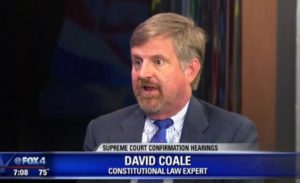 In civil practice, petitions for habeas corpus are uncommon but important when they arise – usually because of a contempt finding about compliance with an injunction or other court order. In re Huddleston reminds of an important procedural requirement: “To obtain habeas relief, the relator must provide proof that he is currently being restrained.” In that case, because “[t]e record includes no proof that relator was arrested or that relator remains confined or restrained,” the petition “does not provide the Court with the proof of current restraint required by [Tex. R. App. P.] 52 and should, therefore, be denied.” No. 05-18-01110-CV (Sept. 25, 2018) (mem. op). See generally In re: Daugherty, No. 05-17-001129-CV (June 19, 2018) (mem. op.) (reviewing sufficiency of evidence to support findings of injunction violations).
In civil practice, petitions for habeas corpus are uncommon but important when they arise – usually because of a contempt finding about compliance with an injunction or other court order. In re Huddleston reminds of an important procedural requirement: “To obtain habeas relief, the relator must provide proof that he is currently being restrained.” In that case, because “[t]e record includes no proof that relator was arrested or that relator remains confined or restrained,” the petition “does not provide the Court with the proof of current restraint required by [Tex. R. App. P.] 52 and should, therefore, be denied.” No. 05-18-01110-CV (Sept. 25, 2018) (mem. op). See generally In re: Daugherty, No. 05-17-001129-CV (June 19, 2018) (mem. op.) (reviewing sufficiency of evidence to support findings of injunction violations).
Monthly Archives: September 2018
 In re: C.R. involved a father’s challenge to a termination order. No. 05-18-00412-CV (Sept. 21, 2018) (mem. op.) The father challenged the sufficiency of the evidence to support the order under section 161.001 of the relevant Family Code subchapter but did not address the grounds found in section 161.002(b) – the issue addressed by the Fifth Court’s recent en banc opinion in St. John Missionary Baptist Church v. Flakes, 547 S.W.3d 311 (Tex. App.–Dallas 2018, pet. filed).
In re: C.R. involved a father’s challenge to a termination order. No. 05-18-00412-CV (Sept. 21, 2018) (mem. op.) The father challenged the sufficiency of the evidence to support the order under section 161.001 of the relevant Family Code subchapter but did not address the grounds found in section 161.002(b) – the issue addressed by the Fifth Court’s recent en banc opinion in St. John Missionary Baptist Church v. Flakes, 547 S.W.3d 311 (Tex. App.–Dallas 2018, pet. filed).
As luck would have it, the C.R. panel included both Justice Evans, who wrote for the majority in Flakes, and Justice Schenck, who wrote the main dissent. The panel majority (Justice Evans, joined by Justice Lang-Miers) held: “In light of [the father’s] failure to challenge the trial court’s termination under subsections 161.002(b)(1) and (b)(2)(B), either of which fully supports the trial court’s termination order, we need not address the unchallenged findings or the grounds raised in [the father’s] brief and affirm the trial court’s order.”
Justice Schenck’s concurrence, acknowledging Flakes as controlling, warns: “We affirm the judgment below in this case, which permanently terminates appellant’s parental rights, without regard to its merits and notwithstanding the heightened due process and due course of law concerns that arise from this fundamental liberty interest.”
 It’s an election year, which leads to ballot litigation, which leads to mootness problems as election deadlines approach, in cases such as Lee v. Dallas County Democratic Party, No. 05-18-00715-CV (Sept. 20, 2018) (mem. op.)
It’s an election year, which leads to ballot litigation, which leads to mootness problems as election deadlines approach, in cases such as Lee v. Dallas County Democratic Party, No. 05-18-00715-CV (Sept. 20, 2018) (mem. op.)
Election cases thus offer a well-defined guideline for when a case becomes moot; in the context of those cases, “[o]nce the time to practically permit continuing judicial scrutiny (including any attendant appellate review) of the absentee ballot has expired, the case has become moot.”
That well-developed standard can be a guide in other civil cases, especially those involving a decisionmaking process such as a director election. (The deadline in an election case can be earlier depending on the facts depending on the mechanics of ballot preparation, as “an election contest is moot once it becomes ‘too late to invalidate a candidate and print new absentee ballots in time for the beginning of the casting of ballots.'”)
Historical Note: Lee reminds that the development of these principles in Texas began with Sterling v. Ferguson, 53 S.W.2d 753 (Tex. 1932), a dispute about Mariam “Ma” Ferguson’s second election as governor.
 In an opinion from last year in a dispute as to whether Dallas or Ellis County was the proper venue, the Fifth Court remanded for additional proceedings. The trial court then ordered transfer to Johnson County and declined to reconsider, citing a lack of jurisdiction after the transfer. The Fifth Court found that its mandate had not been followed, and that the expiration of the trial court’s plenary power before the filing of the petitioner’s mandamus petition “does not affect this Court’s authority to enforce its judgments.” Accordingly, it required the trial court to vacate its transfer order. In re F.A. Brown’s Construction LLC, No. 05-18-00804-CV (Sept. 18, 2018) (mem. op.)
In an opinion from last year in a dispute as to whether Dallas or Ellis County was the proper venue, the Fifth Court remanded for additional proceedings. The trial court then ordered transfer to Johnson County and declined to reconsider, citing a lack of jurisdiction after the transfer. The Fifth Court found that its mandate had not been followed, and that the expiration of the trial court’s plenary power before the filing of the petitioner’s mandamus petition “does not affect this Court’s authority to enforce its judgments.” Accordingly, it required the trial court to vacate its transfer order. In re F.A. Brown’s Construction LLC, No. 05-18-00804-CV (Sept. 18, 2018) (mem. op.)
Findings of fact and conclusions of law are often requested in cases where they are not strictly required. There may be good tactical reasons for such a request, but it will not affect the appellate deadlines unless the findings and conclusions are in fact required. “A request for findings of fact and conclusions of law will extend the time for perfecting an appeal if they are required by the rules of civil procedure or may properly be considered by the appellate court. See Tex. R. App. P. 26.1(4). . . . ). A request for findings of fact and conclusions of law following a summary judgment is not appropriate and does not extend appellate deadlines.” Bosh v. Bosh, No. See Linwood v. NCNB Tex., 885 S.W.2d 102, 103 (Tex. 1994) (per curiam).
of law are often requested in cases where they are not strictly required. There may be good tactical reasons for such a request, but it will not affect the appellate deadlines unless the findings and conclusions are in fact required. “A request for findings of fact and conclusions of law will extend the time for perfecting an appeal if they are required by the rules of civil procedure or may properly be considered by the appellate court. See Tex. R. App. P. 26.1(4). . . . ). A request for findings of fact and conclusions of law following a summary judgment is not appropriate and does not extend appellate deadlines.” Bosh v. Bosh, No. See Linwood v. NCNB Tex., 885 S.W.2d 102, 103 (Tex. 1994) (per curiam).
 “[A]lthough [a] motion for traditional summary judgment did not contain [a] section ‘expressly setting forth summary judgment grounds,’ it was sufficiently specific where it clearly pertained to [the] sole cause of action in question and set forth [a] basis on which movant should prevail.”
“[A]lthough [a] motion for traditional summary judgment did not contain [a] section ‘expressly setting forth summary judgment grounds,’ it was sufficiently specific where it clearly pertained to [the] sole cause of action in question and set forth [a] basis on which movant should prevail.”- “‘Courts have granted summary judgments on causes of action not specifically addressed in a movant’s motion if the movant has conclusively disproven an ultimate fact which is central to all causes of action alleged, or the unaddressed causes of action are derivative of the addressed cause of action.'”
Turner v. Nationstar Mortgage LLC, No. 05-17-01053-CV (Sept. 6, 2018) (mem. op.) (citations omitted for both of the above, which are case parentheticals in the opinion).
 In 2018, the Texas Supreme Court and the Fifth Circuit have taken different approaches to an important type of “Casteel” problem, in which a jury question has several legally viable theories, some of which are not supported with adequate evidence.
In 2018, the Texas Supreme Court and the Fifth Circuit have taken different approaches to an important type of “Casteel” problem, in which a jury question has several legally viable theories, some of which are not supported with adequate evidence.
Federal. After a thorough (and infrequently-seen) summary of how federal law has developed on the “Casteel problem” of commingled liability theories, the Fifth Circuit concluded in Nester v. Textron, Inc., 888 F.3d 151 (5th Cir. 2018): “We will not reverse a verdict simply because the jury might have decided on a ground that was supported by insufficient evidence.” (applying, inter alia, Griffin v. United States, 502 U.S. 46 (1991)).
State. In Benge v. Williams, 548 S.W.3d 466 (Tex. 2018), a medical-malpractice case, the Texas Supreme Court observed: “The jury question in the present case, unlike the one in Casteel, did not include multiple theories, some valid and some invalid. It inquired about a single theory: negligence. But we have twice held that when the question allows a finding of liability based on evidence that cannot support recovery, the same presumption-of-harm rule must be applied.”
(Thanks to Mark Trachtenberg for pointing out this comparison at the recent Advanced Civil Appellate Course!)
 A Dallas and a Midland case both dealt with aspects of the same oil-and-gas exploration project. Predictably, after the litigation proceeded for several years, the issue of whether the Midland litigation mooted the Dallas matter reached the Fifth Court, which reviewed (among other matters) the doctrines of waiver (based on allegedly “unequivocal writings and admissions,” and also drawing on election-of-remedies principles, res judicata, and collateral estoppel. The Court found that the Dallas action could proceed; its opinion illustrates in detail the operation of these important doctrines that police the borders between pieces of litigation (although the related issue of judicial estoppel does not appear to have been in play). TRO-X LP v. Eagle Oil & Gas Co., No. 05-17-00052-CV (Aug. 31, 2018).
A Dallas and a Midland case both dealt with aspects of the same oil-and-gas exploration project. Predictably, after the litigation proceeded for several years, the issue of whether the Midland litigation mooted the Dallas matter reached the Fifth Court, which reviewed (among other matters) the doctrines of waiver (based on allegedly “unequivocal writings and admissions,” and also drawing on election-of-remedies principles, res judicata, and collateral estoppel. The Court found that the Dallas action could proceed; its opinion illustrates in detail the operation of these important doctrines that police the borders between pieces of litigation (although the related issue of judicial estoppel does not appear to have been in play). TRO-X LP v. Eagle Oil & Gas Co., No. 05-17-00052-CV (Aug. 31, 2018).
 I commented today about the start of the Kavanaugh hearings on the morning show of Dallas’s Fox affiliate.
I commented today about the start of the Kavanaugh hearings on the morning show of Dallas’s Fox affiliate.
 Having just now seen Darkest Hour, the Academy Award-winning film about Churchill confronting Britain’s terrible military situation in May of 1940, I was inspired to update the 600Camp blog page about legal writing with an essay written by Churchill as a young man called “The Scaffolding of Rhetoric.” It illustrates five simple ways to put words together to add power to the overall message they convey.
Having just now seen Darkest Hour, the Academy Award-winning film about Churchill confronting Britain’s terrible military situation in May of 1940, I was inspired to update the 600Camp blog page about legal writing with an essay written by Churchill as a young man called “The Scaffolding of Rhetoric.” It illustrates five simple ways to put words together to add power to the overall message they convey.